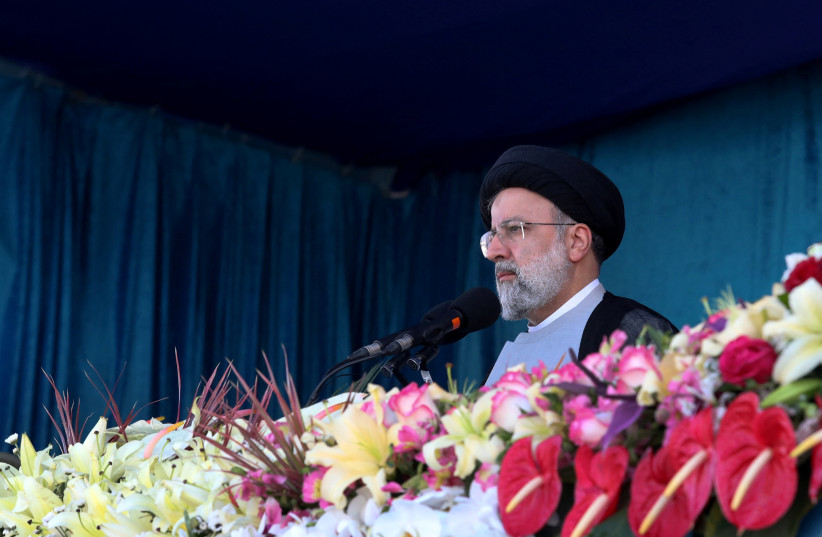Iranian President Ebrahim Raisi expressed on Wednesday his government’s desire for closer cooperation with China, according to Iranian media. Kayhan newspaper in Tehran said that the visit of China’s Minister of National Defense Wei Fenghe this week illustrates strategic ties.
Iran and China are in the midst of a new 25-year agreement that is supposed to enhance ties. What matters now is whether the visit by the key Chinese defense official will result in stronger backing for Iran – and whether this could influence the Middle East.
“Confronting unilateralism and creating stability and order is possible through cooperation of independent and like-minded powers,” Raisi said, according to Iranian media. Iran’s media also said that security ties were part of the discussions. “Wei also met with his Iranian counterpart, Gen. Muhammad Reza Ashtinai, and invited him to visit China, as well as with other Iranian military officials,” the report says.
The official IRNA news agency quoted Ashtiani as slamming the US military presence in the Middle East. “Wherever the US has had a military presence, it has created waves of insecurity, instability, rifts, pessimism, war, destruction and displacement,” the Iranian official said.
China says it wants to improve strategic defense cooperation. “Iran and China have increased their military ties in recent years, with their navies visiting each other’s ports and holding joint naval drills in the Indian Ocean," Kayhan wrote. "In 2021, Iran and China signed a 25-year strategic cooperation agreement that covered a variety of economic activities from oil and mining to promoting industrial activity in Iran, as well as transportation and agricultural collaborations.”

There are not many more official details of the visit. We know that it comes as Iran nuclear deal talks appear to be stalling. Iran hasn’t gotten the US to appease its desires in Vienna. Tehran wants the Islamic Revolutionary Guard Corps to be removed from a US terror designation, which would enable it to tap into more foreign trade.
Reports say that China drone maker DJI has paused operations in Russia amid the Ukraine war. Meanwhile, in the US, Congresswoman Elise Stefanik said she voted to advance the Stop Iranian Drones Act legislation, which would prevent Iran and Iranian-aligned groups from acquiring unmanned combat drones that can be used in attacks against the United States or our partners, according to her statement.
“Iran is the world’s leading exporter of terrorism, and I am proud to support and advance legislation that will keep Iran’s corrupt regime from receiving access to drones that can be used to fuel atrocities in the name of terror,” Stefanik said. “The world should know the United States will use every tool at its disposal to cut off Iran’s access to deadly weapons.”
THE TWO drone stories are interesting because China could be pivoting away from Russia and embracing Iran – and drones could be part of this. Because the China-Iran talks seem to be aimed at condemning the US – and they are talking strategic ties – it’s plausible that Tehran may seek parts from Beijing for its drone program.
Meanwhile, Palestinian Islamic Jihad, which is a proxy of Iran in wars with Israel, showcased a new video of a drone this week. Hezbollah also boasted about offensive drones this week.
It’s also known that North Korea and Iran have cooperated in the past. “North Korean leader Kim Jong-un made a defiant speech at a military parade on Monday night, vowing to ramp up the country's nuclear arsenal," The BBC noted.
"The parade, to mark the armed forces' founding anniversary, also displayed banned intercontinental ballistic missiles (ICBMs),” the BBC said. This matters because Iran may secretly be reaching out to North Korea again for discussions about its long-range ballistic missiles.
US reports say that the White House is concerned about Iran developing nuclear weapons. "The White House clarified on Wednesday that although [Press Secretary Jen] Psaki responded to a question about nuclear weapons, she was referring to the breakout time...and was not referring to the production of an actual nuclear weapon,” reports noted.
Iran is pushing tensions with Israel using its annual Quds (Jerusalem) Day – a day that is linked to the last week of Ramadan and coincides with Laylat al-Qadr, an important day in the Muslim month of fasting.
Iranian media is concentrating on Quds Day. This means that Iran has hosted China's top defense official as it prepares for incitement against Israel. This comes as the Jewish state is growing closer to the West regarding issues involving Ukraine – and as the US wants to put pressure on the Gulf and Israel to distance themselves from China.
Washington doesn’t want its partners and allies having the kind of ties with Beijing that they had in the past. This could mean that China will begin to see its interests more connected with Iran as the US pushes its friends in the region to move away from Beijing.
It also means that Iran and China will be increasing trade. Beijing could be pivoting away from some Russian trade amid the Ukraine controversy. China is interested in boasting trade in the Middle East. While it generally prefers stability in the region for now, Iran does not want stability. This means that, although Beijing and Tehran may not share interests on all files in the region, they increasingly converge on some files.
